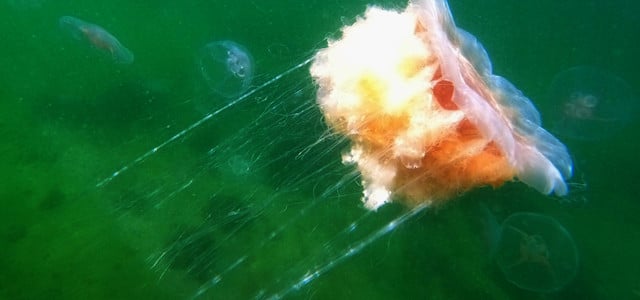
In the past few days, jellyfish have appeared more frequently on the Baltic Sea. Their poisonous nettles have already injured 40 bathers. Where the jellyfish are currently occurring and what to do in the event of contact.
In the past few days, unfavorable winds have caused jellyfish fields to be driven into the Bay of Lübeck in the Baltic Sea, reports NDR. According to the DLRG guard (German Life Saving Society) in Ostholstein, 40 people have already been injured by jellyfish on Timmendorfer Strand alone. The poisonous molluscs are also currently on the move in the towns of Scharbeutz and Niendorf.
How dangerous are stinging jellyfish?
For a healthy person, contact with a stinging jellyfish is not dangerous, but very painful. On the tentacles of the sea creatures, which can be up to 20 meters long, there are nettle pods that can penetrate the skin a few millimeters when touched and inject a poison there that causes a burning pain. In addition, there is sometimes severe skin irritation and red welts.
According to the Ostseemagazin, however, contact with sensitive people can also lead to allergic reactions, cardiovascular problems or even a collapse.
What helps against jellyfish injuries?
According to NDR, the affected area should under no circumstances be rinsed with fresh water. Because on first contact, often only 10 to 20 percent of the stinging capsules would have injected their poison. Rinsing could burst the remaining vessels and cause even more pain.
The DLRG recommends treating the nettle capsules with shaving foam instead. This must act briefly and dry. The jellyfish parts can then be scraped off with a hard plastic card (such as a bank card). If you don’t have shaving foam at hand, you can also use wet sand or vinegar.
Prevention is better than subsequent treatment: Anyone who notices a plate-sized, reddish-looking umbrella under water should distance themselves from it and give them a wide berth due to the sometimes very long tentacles of the jellyfish.
Sources used: NDR, Ostseemagazin
Read more on Techzle.com:
- Delivering parcels to the front door: Who bears the liability risk?
- Dolphins attack people in shallow water
- “Train for sweating in good time” to prevent heat death